The initiative is also helping farmers in getting additional income by selling the stubble for conversion into biomass pellets, the Power Ministry said
In order to reduce stubble burning and to cut down carbon footprint of thermal power stations, India has started using bio-mass in the coal based thermal plants across the country, the Ministry of Power said in a statement issued on Wednesday.
This step has been taken in accordance with the National Mission on the use of biomass in thermal power plants, the Ministry further said.
To ensure that the initiative on the use of biomass goes in sync with the National mission, all thermal power plants have been directed by the Ministry to use 5 to 10% biomass along with coal for power production.
According to the Ministry, as on date, approximately 59,000 metric tonnes (MT) of biomass has been co-fired in thermal power plants in the country, while tenders for 12 million metric tonnes (MMT) are at different stages of process for short term and long term duration.
“Out of this, the biomass co-fired in the NCR region stands at 21000 MT and tenders floated in the region are about 5.50 MMT. Contracts have already been awarded for more than 11 lakh MT of biomass pellets,” the Ministry said.
NTPC has emerged as a leader in biomass user having co-fired approx. 58,000 MT of biomass, while tendering a total of 10.7 MMT over a short-term and long-term basis, the Ministry added.
Among the State Governments, Haryana’s Genco has been able to co-fire around 550 MT of biomass in two of its stations and float tenders worth 11 lakh metric tonnes, the Ministry informed. In Punjab, UP and Maharashtra, some public and private electricity generating companies have started co-firing small quantities of biomass, the Ministry maintained.
“The results so far are encouraging and there is still a long way to go before the country can achieve its target of 5-10% co-firing in all plants in the country. This will be achieved with active participation of all Central/State Gencos and Independent Power Producers,” the Ministry added.
 Contact Us
Contact Us  Subscribe Us
Subscribe Us









 Contact Us
Contact Us
 Subscribe
Subscribe
 News Letter
News Letter

